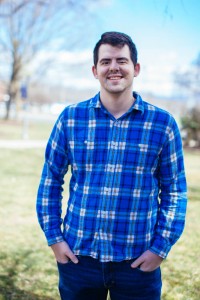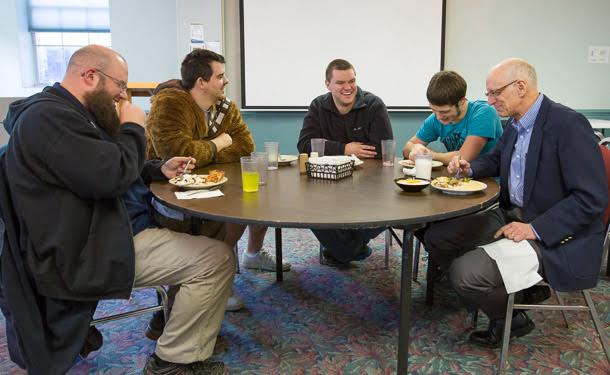During one recent Friday lunch hour, a group of about a dozen male students, faculty and staff gathered around tables in Eastern Mennonite University’s dining hall and broached the question, “What makes men men?” Is it careers, athletic ability, attitude, even facial hair?
A vigorous discussion followed, and the Campus Ministries office hopes that many more follow—part of a new effort to create a men’s ministry on campus.
EMU senior Wesley Wilder, a student pastoral assistant in Campus Ministries, says the idea began through conversations in an off-campus apartment. Some upperclassmen were talking about possibilities to become better engaged and connected and began to brainstorm.

“We recognized a need to revamp what we had been doing,” Wilder says. “We saw a need or desire for men on campus to talk about man-like things.”
That prompted Wilder to make such a ministry a focus of his work. In addition to regular Friday lunch discussions, the men’s ministry has also offered monthly Saturday morning hikes with faculty leader Ron Stoltzfus and held a Spiritual Life Week retreat at Lake Anna on the theme “Man Makes Myth Makes Man.”
While past efforts at men’s groups have often focused solely on topical concerns, such as sexual assault education, the new effort is broadly oriented toward faith, open sharing and personal connections.
“The hope is that this continues to be a space where however many people show up can get together and have conversation and intentionally build relationships with people they might not have connected with,” Wilder says. “Already several faculty and staff members have come that I had never met before.”
Eastern Mennonite Seminary student and Campus Ministries intern Micah Hurst says much of his identity growing up revolved around being a baseball player, until a back injury altered that path. He started questioning who he was, and what it meant to be a man. If Christians don’t take time to reflect on what masculinity means, Hurst says, then “we give up that authority to our culture.”
“Masculinity takes on a whole different meaning depending on our generation and all our different cultural experiences,” Hurst says. “We want to get a more holistic understanding.”
Hurst says he and Wilder noticed that many men on campus didn’t come to the Bible studies or other Campus Ministries activities that were already being offered. The new approach aims to provide “opportunities to have quality conversation at places people already are or want to go,” Hurst says.
“The EMU mission and vision statement says we’re a campus that intentionally builds community with one another,” Hurst says. “This is a great opportunity to do that, 10 men at a time. We hope that people come into this space and create this conversation in other spaces, too.”
